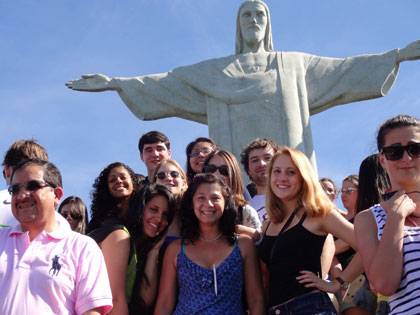
Duke has launched a new, faculty-led initiative to forge new connections between Duke's campus and Brazil, strengthening the ties between the university and a country whose global influence is rising.
Led by professors Paul Baker of the Nicholas School of the Environment, John French of history and Center for Latin American and Caribbean Studies (CLACS) Assistant Director Antonio Arce, the Duke Brazil Initiative (DBI) seeks to deepen Duke's already substantial engagement with the nation that has the world's eighth largest economy.
"What I like to say is that Brazil is the world's largest country that we know the least about," said French. "Duke is now coming together, with the support of the administration, to address this fact."
With seed money provided by the Office of Global Strategy and Programs, DBI's initial focus will be faculty and student research exchanges. These will take place in both Durham and Brazil, bringing together students and faculty from Duke and top universities and research centers in a country where higher education enrollment has doubled in the past decade.
The idea originated with Baker, a geochemist with a longtime interest in Brazil, especially the Amazon. He found a sympathetic colleague in French, a fellow senior faculty member affiliated with CLACS. "We felt this was an important thing to do, and it turned out there were also so many other people committed to this," French said. "And that was the big surprise, as well as the support from the administration. It's about taking what's already being done and taking it to the next level."
The Duke Brazil Initiative gathered steam late in 2013, as French canvassed colleagues across campus with interest in Brazil and put together a core group of 40 faculty members from seven different schools. As Baker notes, their enthusiasm was more than matched by their students.
"The students are always ahead of the curve," said Baker. "If there's buzz, the students know it way before we do."
French agreed that "student interest has preceded the faculty in beginning to move this way."
"Even before it gained attention because of the World Cup and the Olympics [which Brazil will host in 2014 and 2016, respectively], Brazil had been a growing interest for a variety of reasons," he said. "In a way, we're following the lead of some of the students."
Both professors said working with partners in a nation that's both an economic powerhouse and a center of dynamic social movements and expressive culture would strengthen Duke. Brazil has been of special interest as well for those working in medicine -- including AIDS outreach -- and in environmental protection.
"Duke needs Brazil," French said. "Of course Brazil will benefit from Duke faculty and students, but at the same time Brazil has an enormous amount to benefit Duke."
DBI is supported by its sponsor, the Office of Global Strategy and Programs, which has provided $50,000 in seed money. CLACS, a longtime advocate of Brazilian studies at Duke, serves as the initiative's institutional home.
Duke's interest in Brazil is not new. It already offers a full program in Portuguese; the Duke in Brazil program provides students immersion in Brazilian culture; and several recently hired faculty members have a special interest in Brazil, offering coursework on topics such as Brazilian social issues and cinema. A Luso-Brazilian Studies major is under development, and funding for the first round of undergraduate, faculty and graduate student exchange grants is now available.
Indeed, DBI has already served the critical function of making Duke aware of its myriad of Brazil-related resources and creating common spaces where scholars from different disciplines can meet.
"There are more people at Duke doing things about Brazil than we knew about," said French, "and many more than we thought would be interested in learning something or getting involved with Brazil."
French was one of six professors who joined Duke's Center for Latin American Studies when it was formed in 1991. "Now Latin American Studies is recognized in many disciplines, including my own," he says. "Our Latin American History graduate program is among the top 10 of its kind. We're going to try to do the same thing with Brazil -- to make Duke a well-known place for Brazilian studies."